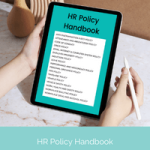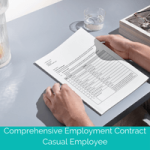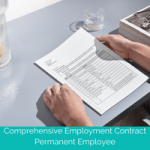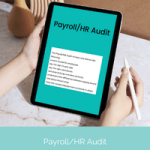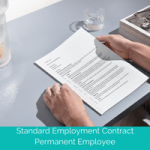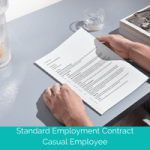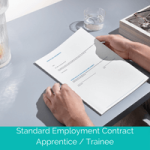The Australian Government has passed the “Secure Jobs, Better Pay Bill” to include a range of new workplace laws resulting in major HR changes to be implemented across the country. These laws include measures such as paid family/domestic violence leave, increased job security, gender equality, pay transparency, anti-discrimination, flexible work and more.
As a small business owner or manager, it is important that you understand how HR changes under the Bill will affect your business and workplace. In this blog post, we discuss the key provisions of the new laws and how they will impact HR departments.
2022 HR Changes – The Impact on Australian Businesses
1. Paid family and domestic violence leave
Under the new Fair Work rules, employees (including part-time and casual employees) will be entitled to 10 days of paid leave in a 12-month period if they experience family or domestic violence. This replaces the existing entitlement of 5 days of unpaid leave that was under the National Employment Standards.
Employees will be allowed 10 days of paid leave starting from the new policy’s implementation date. If employees do not use their allotted leave, it will not roll over to the next year. The policy comes into effect on:
- 1 February 2023 for employees of non-small businesses
- 1 August 2023 for employees of small businesses
Until then, Employees can still access 5 days of unpaid family and domestic violence leave.
2. Gender equity
Changes are being made to improve gender equity, such as adding it in as one of the objectives of Fair Work Act and modern awards/minimum wage. Secondly, pay secrecy clauses will be banned, and any employer caught including this term in a contract or agreement will face fines.
The new provisions establish employees’ right to share pay information as a workplace protection under the Fair Work Act. The current equal remuneration provisions will be amended to incorporate the substance of Queensland’s equal remuneration principle, including removing the need for a direct male counterpart performing the same role whose pay demonstrates discrimination. The existing provisions of the Work Values Act will be amended to reflect modern, gender-equal standards.
3. Flexible working arrangements
The National Employment Standards (NES) currently offers employees the right to request a flexible working arrangement in specific cases, like managing carer responsibilities. However, the current provisions have been criticized for not including a guaranteed dispute resolution mechanism when an employer denies a request.
The Bill includes an amendment that would enable employees to access arbitration through the Fair Work Commission (FWC) where disputes over requests for flexible working arrangements cannot be resolved in the workplace. This amendment aims to ensure workers have better access to flexible work arrangements, and to improve job satisfaction and productivity.
4. Sexual Harassment
The HR changes will introduce a dispute resolution process that is modelled on the General Protections framework. Respect @Work: National Inquiry into Sexual Harassment in Australian Workplaces this change comes as a result of Recommendation 28. The new provisions are being put into place to prohibit sexual harassment “in connection with work”.
The FWC will be allowed to make “stop sexual harassment orders” and other types of orders, such as compensatory orders for agreed-upon arbitration cases involving sexual harassment complaints.
There will be new grounds for discrimination against employees’ breastfeeding, gender identity and intersex status included in modern awards and general protection provisions.
5. Job Security
The Fair Work Act will now include job security as one of its key objectives. In addition, new restrictions on fixed-term contracts that exceed two years will be introduced, with exceptions for specialised tasks, government-funded positions or modern awards that permit it.
Amendments to the Bill proposed in the lower house included employers given a grace period of 12 months to adjust to changes in their fixed term contracts, and making it harder for employers to bypass the system by adding a rule that they must re-engage an employee rather than just hiring someone else to do the same job.
6. Bargaining
The proposed changes to enterprise bargaining in the Bill have been the center of public debate since it was tabled. These changes include:
- Initiated bargaining
- Single interest bargaining authorisation
- Supported bargaining authorisation
- Changes to industrial action
- Intractable disputes arbitration
- BOOT – Better Off Overall Test
- Termination of Enterprise Agreements
- Changes to redundancy entitlements
More comprehensive information regarding the impact of these wide-ranging bargaining changes is available from My HR Partner.
7. Institutional Changes
The Bill eradicates the Australian Building and Construction Commission and the Registered Organisations Commission, with the Fair Work Ombudsman being reassigned their functions.
Under an amendment added in the lower house, a National Construction Industry Forum will be set up as a statutory advisory body.
The Government has announced that it plans to release more legislative proposals in the near future, specifically a whitepaper developed by the Employment Taskforce in Treasury. This is estimated to occur in September 2023.
HR News Flash: Businesses Fined for Non-Compliance
Did you know? The Fair Work Ombudsman has fined growers, labour hire providers, and other employers a combined total of $78,362 for breaching pay slips and record-keeping laws in the last year. This includes businesses in Victoria’s Sunraysia region, South Australia’s Riverland, and Coffs Harbour and Grafton, NSW. The FWO has investigated 237 businesses where it is suspected the rules are not being adhered to since December 2021.
The best way to safeguard your business against being fined is to ensure you are fully compliant with the current laws and new HR changes.
Need help to ensure HR compliance?
For further expert advice on human resources or if you have any questions about anything HR related, get in touch.
Karen Hillen is your HR Partner, she helps businesses by providing HR support and advice services.
For the right HR support and advice, book a My HR Partner HR Advice call with Karen Hillen.
https://booking.myhrpartner.com.au/15minute-hr-advice-call
https://booking.myhrpartner.com.au/30minute-hr-advice-call
My HR Partner memberships provide 24/7 access to employment contracts, HR policies and documents, and HR advice calls. These services are tailored to the member’s needs and can be accessed on demand through phone or email for performance management issues, pay rates and Award advice.
Find out more about My HR Partner HR Hub membership here:

